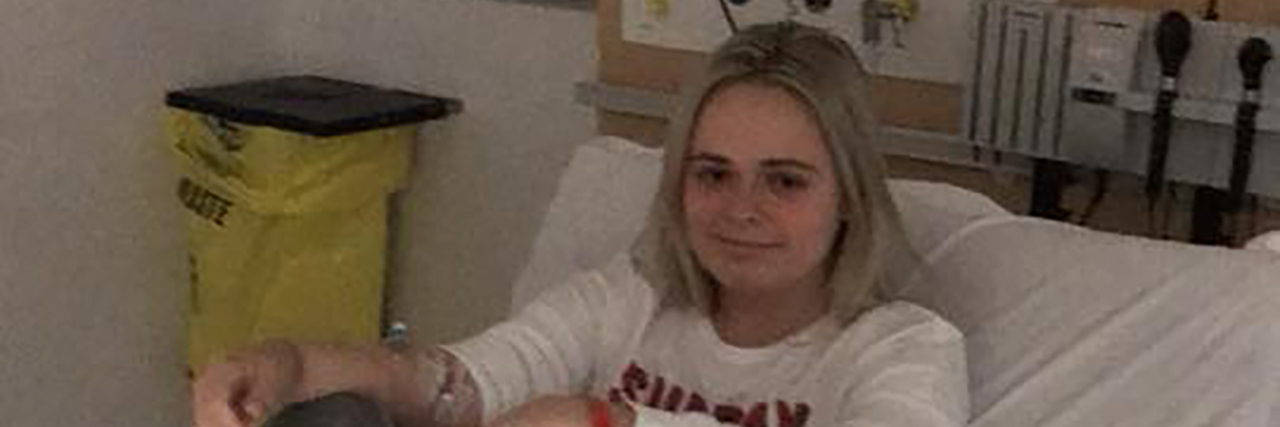What I Wish I'd Known When I Was Diagnosed With Juvenile Idiopathic Arthritis
The diagnosis of a chronic illness can be like a curveball spinning at a rate of knots straight towards your face. It can be unexpected, sudden and if such ball hits you, it hurts. It opens a world of unknown and for most, fear. There are certain things I wished I’d known when I was first diagnosed with juvenile idiopathic arthritis that could have made my life transition a hell of a lot easier.
Here are five things I wish I’d known:
1. You are not defined by your illness.
I know this is a common phrase, but its truth is enormous. I was diagnosed at 11 years old (grade 6) and suddenly I was unable to do the sports I loved or just play with my friends. Even buttering toast became a painful task. Throughout my early high school years I let my illness define me – I labelled myself as a “cripple.” Although it hurt to walk, run and carry out daily activities, I was still the same person I was before I was diagnosed, just with some added barriers. I let my illness alter my perception of myself as I believed I was no more than the painful symptoms. I wish someone had told me that just because I required braces, medications and was constantly hospitalized, I could still be the bright and bubbly girl who lit up the room with a smile. It wasn’t until I was 17 that I finally embraced and accepted my illness as a thing I live with – not a thing that defines me.
2. Not everyone is going to understand and that’s OK. It’s not always their fault either.
I had a terrible time in high school, with a wide lack of understanding about my illness. I struggled with teachers as they were ignorant towards such a young person living with an illness they couldn’t see. I had peers who complained to others about my special considerations for exams as they just couldn’t see why I got it and they didn’t.
I still encounter people who just don’t seem to understand the concept of an invisible illness, but I’ve learned not to blame them. It’s difficult to see unless I am wearing braces or using aids, so I can sympathize when they just don’t get it. As frustrating as it is, until there is more awareness about invisible illnesses, the stigma will remain. I’m not making excuses for those who are just plain rude, but I wish I’d been told that I would come across people who just couldn’t see past the fact that I look “OK.”
3. It can get lonely, but don’t push people away.
When you live with constant pain most others don’t have, you tend to become isolated. Whether you isolate yourself and push those around you away, or those in your life run for the hills because they “can’t handle it,” it can be incredibly lonely living in pain. I wish I’d known that people would leave due to a lack of understanding. I wish I’d known that times would get very lonely and in those times it is best to be prepared. Have a lifeline such as a friend or a cousin, or even a helpline website/phone number. Have a favorite candle to burn for when the pain becomes unbearable. Have something to keep your mind busy like coloring or journaling. Having a backup plan is the best way to get yourself through the loneliest of times.
4. Stop feeling guilty about resting.
One of the worst parts of a chronic illness is when you have to stop trying to keep up with everyone else and being “healthy.” You’re sick and it’s OK to take a break. I wish I’d known to be OK with letting myself sleep for the entire day. I used to (and still do to this day) beat myself up about needing a break, a nap or to just press pause on life for a day. I recently watched my friends move away to study and continue their life journey, after I had to move back home from university due to my health declining. The only way to describe the way that made me feel is soul-crushing.
5. Life isn’t always going to go to plan; just let it be.
This applies to all of us, even those without chronic illness. Life is like a roller coaster with ups and down along the way, but life with a chronic illness just means “your roller coaster has more hills.” I wish I’d been told that when life unexpectedly changes your direction, more often than not, a bigger and better opportunity will open for you. So just let it be.
Yes, your life changed, but no matter what, you’re still you.
Follow Alyssa on Instagram.

